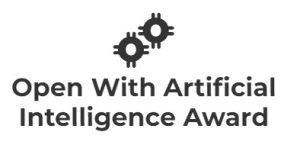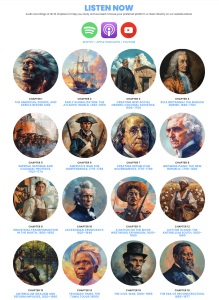[History] OpenStax US History Audiobook
Description of the Resource:
This project brings together two emerging trends in OER content creation by using cutting-edge artificial intelligence tools to produce a high-quality audiobook. As a follow-up to our successful audiobook production of American Government 3e, I utilized artificial intelligence tools to produce this audiobook adaptation of OpenStax’s popular US History textbook. Listeners will expand their knowledge of American history, ranging from pre-European contact to present day. The complete audiobook spans 42 hours of high-quality audio, representing 32 textbook chapters. Each chapter has been made available for free on Spotify, YouTube, and Apple Podcasts.
The emergence of artificial intelligence voice models has expanded the range of possibilities for OER content creators. ElevenLabs software was used to narrate the project’s text. ElevenLabs is best known for their AI-powered text-to-speech software (Speech Synthesis), with highly accurate AI models trained on natural human voices. The results are often indistinguishable from human-narrated text, including lifelike intonation and pacing. I trained an ElevenLabs Professional AI voice model using 4 hours of my own previous narration as source material. This resulted in a highly accurate clone of my own voice, which I used to narrate the bulk of the text. Additional voices were used to announce section headers, learning objectives, and callout boxes.
Additional artificial intelligence tools were used to develop the accompanying chapter art on our project website. MidJourney is a popular AI tool that converts user prompts into stunning artwork. I developed MidJourney artwork that represented the key ideas and historical moments discussed in each chapter. This greatly enhanced the visual quality of our website.
As with our previous audiobook project, an instructor Canvas page was developed and published to Canvas Commons. This resource includes embedded audio players, textbook chapters, and links to the OpenStax resources. Instructors can seamlessly integrate these free materials into their existing courses, increasing accessibility and learning options for their students.
How This Resource Integrates Diversity, Equity, and Inclusion Principles and Practices:
As discussed in my entry for American Government 3e, audiobooks are a valuable resource for many diverse student groups. We expect that this project will be especially impactful for the visually impaired, those with specific learning disabilities, auditory learners, ESL students, and working students, among others.
The integration of AI-generated voices also expanded the range of vocal qualities in the narration. The library of AI-generated voices allowed me to bring primary source material to life. Having access to a wide variety of voices—representing distinct voices, accents, ages, genders, and nationalities—allowed me to better fit the text to the original context in which it was written. I was also able to make speeches and quotes from the 20th century feel more authentic by using ElevenLabs “Instant Voice Clone” feature. For example, I cloned the voice of President Franklin Roosevelt using his speeches in the public domain to narrate portions of text in a voice very similar to his own. This attention to detail improves the listening experience, by allowing for a more authentic and context-accurate narration.
Testimonials and/or Reviews:
“I just want to thank you so much. You save me and my online history class. I have a learning disability and make it very hard to read. My read-aloud [software] would glitch out. It would take me an hour to read one segment of the book. Now I can read the whole chapter in 45 minutes. Thank you so much.”
– YouTube Comment
Tips, Tricks, and Advice from the Faculty Author(s) Regarding OER Creation:
Experiment and follow your interests. The realm of possibilities in the creation of Open Educational Resources is beginning to expand greatly. Creators are developing resources in a wider variety of mediums and formats than ever before. We have new tools at our disposal, which allows us to take risks and try novel approaches. If you have a unique idea, pursue it.
If you are adapting or remixing existing OER content, I also encourage you to prioritize communication with the original authors or producers. My project benefited greatly from regular communication with the OpenStax team. They even provided me with new content that had not yet been incorporated into the online textbook. This ensures that my final project will remain relevant for a longer period of time.



